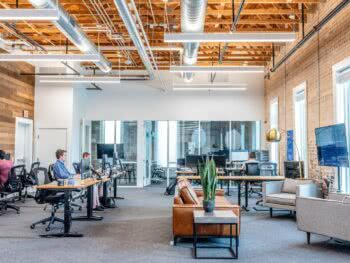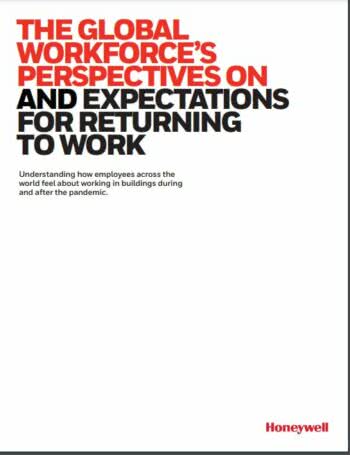
Want to get workers back into your office? Listen to them!
New Global Study from Honeywell and Wakefield Research Gives Us Feedback from Workers Themselves
In a word: safe. If you want people back into the office, make them feel safe. That’s the conclusion of a new 32-page report from Honeywell and Wakefield Research.
“Workers are keenly attuned to what’s happening to make their workspaces safer and healthier, especially aspects like air quality and adherence to safety guidelines, which wasn’t previously a concern for some people,” said Vimal Kapur, president and CEO of Honeywell Building Technologies. “Air quality, for example, is not something that will be dismissed once we’re on the other side of this pandemic – it will be essential to the occupant experience – and help make workers feel more comfortable as they return back to their offices.”
The comprehensive report, which contains charts, graphs and commentary from global workplaces in the U.S., UK, Germany, and the Middle East, is actually a blueprint for facility managers, showroom managers, owners and manufacturers on addressing the attitudes of their workforces with actionable strategies.
 For example, here are some key insights that would lead to such actions:
For example, here are some key insights that would lead to such actions:
- Even though 83% of the survey respondents have continued to work inside a building part of full time, only 54% think their building management has taken the steps necessary to keep them safer on the job.
- On a global scale, offices are viewed as more safe than schools or universities.
- Overall, respondenets think management should do more for their safety
Blame Game
The survey noted that while workers thought their company is responsible for making the workplace safer, “executive-level workers place more responsibility on building or facility management.”
In the U.S., OSHA (Occupational Safety and Health Administration) clearly states: employers have a responsibility to provide a safe workplace. In fact, OSHA offers specific regulations about COVID-19.
CDC offers guidance, too, and bounces back to OSHA with a link.
What is becoming apparent is that these ideas of who is responsible is evolving, including the individual taking a degree of responsibility for staying safe. University of New Hampshire, for example, offers Staying Safe at Work training is a curriculum for teaching workers with intellectual and developmental disabilities about health and safety on the job. The CDC as well offers guidance (i.e., YOUNG RETAIL WORKERS: What You Know Can Keep You Safe and Healthy at Work).
“Many facilities have made changes to their procedures but have not invested in the building itself – and respondents noticed,” said Kapur. “Workers are going to demand more from buildings in the future, and we’re even seeing with these survey results that creating a healthier and safer environment will be differentiator to staff retention and recruiting, which may even impact long-term real estate value.”
The 32-page report can be downloaded upon request here. The Honeywell survey was conducted by Wakefield Research (www.wakefieldresearch. com) among 2,000 workers in buildings of 500+ workers in the following markets: U.S. (500), U.K. (500), Germany (500) and the Middle East (500), between November 19th and December 1st, 2020, using an email invitation and an online survey. The data was weighted to ensure an accurate representation of countries’ population size for the Middle East.
About Honeywell Building Technologies. Honeywell Building Technologies (HBT) has over 23,000 HBT global employees who support buildings of every type, from commercial offices, stores and schools to hospitals, airports and arenas. The company’s diverse technologies and brands enable them to create holistic solutions, improving virtually every aspect of your building’s environment and experience.
About Wakefield Research. Wakefield Research is a market research consultancy specializing in strategic and tactical research for corporations and organizations throughout the Americas, Europe, Africa, the Middle East, and Asia. We combine best-in-class research practices with expertise in a wide range of industry verticals.
Editor's Note: